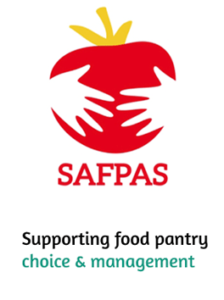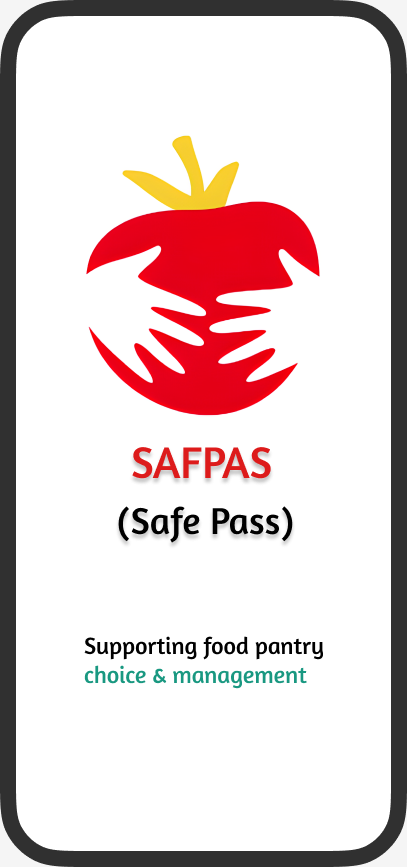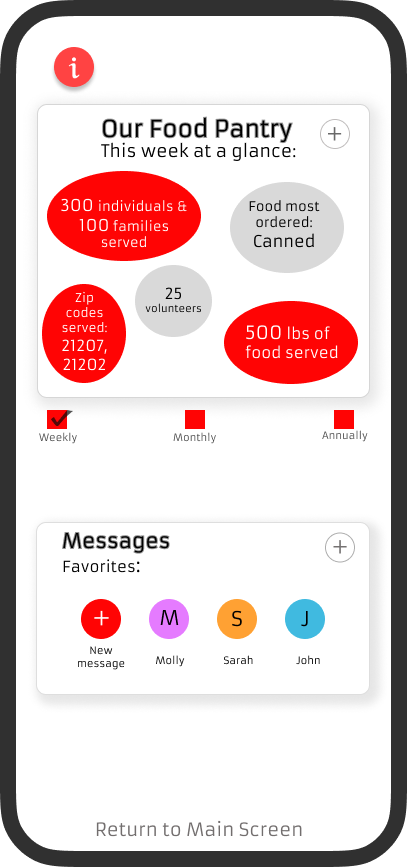Support Application for Food Pantries (SAFPAS)
Overview
Food pantries face many challenges, including recruitment and training of staff/volunteers, communications with staff/volunteers and neighbors, providing neighbor choice, and emergency preparedness. We will develop, implement, and evaluate the Support Application for Food Pantries (SAFPAS), a mobile application to address these concerns under normal and emergency operations, and assess its impact on 20 Baltimore food pantries, and on the healthiness of foods received by 360 food pantry neighbors using a randomized controlled trial design. If successful, the tested and refined app will support local food assistance programs throughout the United States.
Project Aims
Phases of Research
| Phase | Title | Description |
|---|---|---|
| 1 | Formative Research (completed) | In-depth interviews were conducted in Baltimore City and Detroit with food pantry directors, volunteers, food bank leaders, pantry clients, and agency representatives. These interviews focused on refining the app prototype by improving features such as online ordering, capacity-building, and emergency preparedness, and integrating nutrition messaging and stakeholder recommendations. |
| 2 | SAFPAS App Development (in progress) |
Results from the formative research phase are incorporated into the development of a working version of the SAFPAS mobile app. |
| 3 | SAFPAS Baseline Data Collection (in progress) |
Food pantries, their managers, staff, volunteers, and clients, will be recruited for evaluation of the app. Baseline data will be collected to assess feasibility and preliminary impact of the SAFPAS app. |
| 4 | SAFPAS Pilot App Implementation | All food pantry stakeholders will receive training on the newly introduced elements of the app. Process evaluation will take place including data recorded both by our interventionists and user data produced by the SAFPAS app. Revision and strategies to improve usage and user satisfaction will be implemented as needed. |
| 5 | Post-intervention Data Collection | Pantries in the control group will be compared to those receiving the SAFPAS app to evaluate the app’s impact on the healthiness of available and received foods, staff capacity, emergency preparedness, and food security-related behaviors. |
| 5 | Data Analysis | Data collected at baseline and post-intervention will be used to evaluate the impact of the SAFPAS app. Results from Food Pantry Client Impact Questionnaires, Food Assessment Scoring Tool (FAST) scores, and anthropometric measurements, along with Environmental Checklists and Emergency Preparedness Questionnaires, will be used. |
App Features
We are implementing these app features using a phased approach, beginning with volunteer features,then moving to echoice capabilities, and finally wrapping it up with the emergency preparedness capacities.
Food pantry staff and volunteer features:
Volunteer recruitment, training and scheduling; communication with neighbors and city agencies; emergency preparedness training and communications.
Food pantry neighbor features:
Resources locator, eChoice (online ordering/selection of preferences), nutrition education, emergency preparedness information, communication with pantry.
City and State Agencies:
Communications dashboard with other city agencies and food pantries, real-time situational awareness.
App Wireframes
In our formative research, we have conducted various interviews with food pantry coordinators, neighbors, volunteers, and food bank staff in Baltimore and Detroit on both the form and function of the intended application features. We utilized their feedback and suggestions to inform how we developed this second version of our wireframe images.
Publications
Staff
If you would like the data collection forms please email Joel Gittelsohn.
Legal Disclaimer: Under Copyright Law we encourage you to use our materials for personal or educational purposes, provided that a copyright notice accrediting the content to “Dr. Joel Gittelsohn/Johns Hopkins Bloomberg School of Public Health” is attached to the reproduction. No reproduction may be made of any of the artworks from this website for commercial use for any reason without first receiving written permission from Dr. Joel Gittelsohn/Johns Hopkins Bloomberg School of Public Health.


















